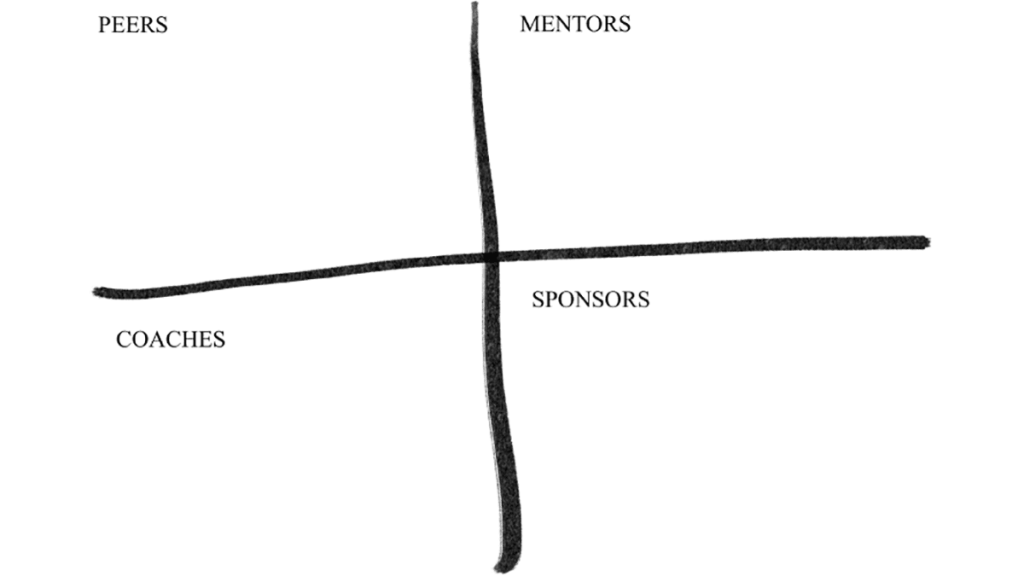
Illustration: Black Illustrations
Successful leaders of color need a deep bench of support. Here’s how you can help
It’s time to think about mentoring and coaching as a team sport, not 1 to 1
No one succeeds in journalism alone.
Behind every byline is an editor, a copy editor, a photo editor, a graphics editor, a fact-checker and more.
Journalism has always been a team sport, a collaborative effort.
So why should we treat the rise to the top of a newsroom any differently?
Folks need mentorship in order to hone their skills and build their confidence. But for journalists and leaders of color, a mentor alone may not be enough.
Whether you consider the old adage, “it takes a village to raise a child,” or you’re attracted to the concept of a “personal board of directors,” the throughline is simple: We need different levels of support at different times, and that support may come from different folks.
This means you need mentors to help you be your best self. This means you need coaches to help you reach the next level. This means you need peers and colleagues to cheer you along. And it means you need sponsors to push you into the chapter of your adventure.
I often get asked about the difference between mentorship and sponsorship. I’ll also add coaches and colleagues to the mix (mostly because it creates four equal quadrants, which is relevant for the template I’ve included below).
What is a mentor?
A mentor is someone who helps you reach the height of your best self. This means they may help you with your resume, give you interview prep tips or help you navigate a tricky situation in your current role. Mentors may also help you hone your skill set: investigative skills, social media reporting, or even data journalism. This person could be older than you, or they could be an age/experience peer. It doesn’t matter how that relationship comes together, as long as you’re both enriching each other’s lives in some way.
What is a coach?
A coach differs from a mentor in that their work with you is goal-focused. This means the coach is always trying to push you beyond your existing limits. A coach is working with you to get to the next level: gain that promotion, negotiate that raise, or even land a new job. Coaches and mentors often get lumped together as one, but to me, the distinction is whether you are set on achieving a goal or not.
What is a sponsor?
Sponsors are different from mentors in that they are the ones spending their personal capital in order to get you to the next level. This could look like speaking up for you in a closed-door meeting with the higher-ups. This could look like putting your resume at the top of a hiring manager’s pile. This could look like giving you the toughest feedback so that you’re able to rise. Sponsors can be harder to identify and attract than mentors, because it requires the sponsor to be ready to spend some of their hard-won power on your behalf.
So, now what?
So, if you’re a journalist of color eyeing your next move, start by mapping out your support system. I’ve included a template here that you can start with.

Make a list of the people you talk to most frequently about your work and career. Answer these four questions:
- Who offers you support?
- Who helps you move the ball forward?
- Who gives you the best solutions to try?
- Who gives you a careful, listening ear when needed?
Once you’ve identified 5-12 people in your life who could be part of your team, look at each person and think about whether they are your mentor, your coach, your peer or your sponsor.
Remember, sponsors choose you, while mentors and mentees often choose each other.
Using the four quadrants, map out your team of support. Who can you call on for real talk? Who can you reach out to for constructive feedback?
Once you’ve mapped out your team, see where you’re coming up short. For most folks, it will be a lack of coaching and a lack of sponsorship. This is where your employer can come into the picture.
“I’m interested in rising into a leadership position, and I think I would benefit from some formal or informal career coaching,” is a great way to start this conversation.
How to attract a sponsor is a little more nuanced, but this is a great longer read on the subject.
But once you are putting signals out that you are ambitious and looking to be aggressive about your career, folks will know that you are a sponsorable candidate.
I’d love to hear how this conversation goes for you, or whether you find this matrix helpful!
Please feel free to reach out with feedback: @emmacarew on Twitter or emma@kimbap-media.com.
